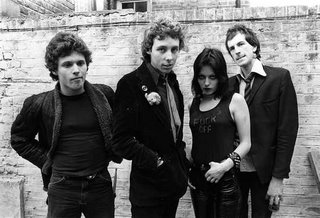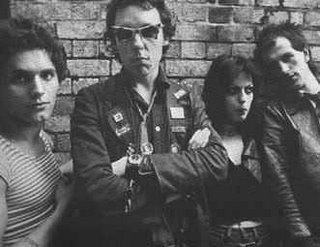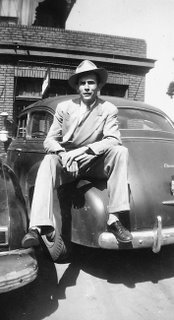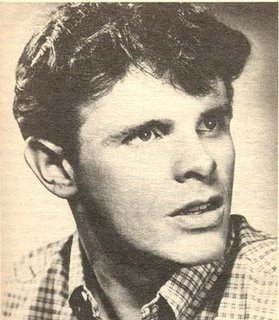News item the first: Job interview Monday! Stay tuned.
News item the second: If there's any better way to travel on a Friday than with the car windows down and
Operator's Manual blaring out of your speakers, I'd like to know what it is.

The Adverts are one of those bands that always seems to get the short shrift in the history books. They rocked way harder than the Sex Pistols and lead singer TV Smith's packed lyrics were more artful than a lot of Joe Strummer's clunkier verbal musings, as well as anticipating punk rock wordsmiths like Greg Graffin and Darby Crash.
They debuted in 1977 with the incidiery single "One Chord Wonders," as much a punk rock manifesto as anything else. In essence a tune about pissing off the audience and not giving a whiff of a fuck, it (and their other early songs) also presciently predicted very early in the punk "movement" that it would be full of idiots and trend-hoppers, it would cynically adopted and changed into "new wave" by the music industry, and that media coverage would be a gross generalization at best. Call it a lucky guess, but they hit it right on the head.
After a few more killer singles (including "Gary Gilmore's Eyes" and "No Time to be 21"), they released the LP
Crossing the Red Sea, one of the best punk albums ever made. Featuring fireballs like "Bored Teenagers," "Bombsite Boy," and "Safety in Numbers," Smith continued to grow as a songwriter, refashioning the mid-tempo gurglings of the Sex Pistols into taut, speedy firecrackers that would go on to influence the first wave of American hardcore. Also, the long, drawn-out avant-rock intro and outro to "Bombsite Boy" can be heard in the sound of Public Image Limited and Shellac, amongst others.
As always, inter-band tensions did the thing they do where they fuck up a good thing. Bassist Gaye Advert was always being featured more prominently in magazines and ph

otos because she was one of the most attractive women in punk at the time (although, when your only competition is Sue Catwoman, that ain't too hard at all). She was also criticized harshly (maybe too harshly) for her lack of chops on the four-string, and there was much speculation as to how much of a hand Smith had in the studio when it came to the instruments.
Signing to RCA for their second (and final) album, 1979's
Cast of Thousands was greeted with naught but critical derision when it was first released. Featuring polished production and (*gasp*) then then-unthinkable keyboards and synthesizers, as well as a more open-ended approach to songwriting, it was Smith's attempt to expand the group's palette. Of course, two years later, scads and scads of British punks co-opted this approach under the New Wave umbrella and took it straight to the top of pop charts. The same critics who shouted down
Cast of Thousands are probably the same ones who got worked into a froth over the Psychedelic Furs - "I Surrender" sounds like almost every song on
Talk Talk Talk.
Between the internal bickering and the complete lack of a response to
Cast of Thousands, the Adverts disbanded in 1979. They were really ahead of their time in a lot of ways, and hundreds of bands have picked up little tricks here and there from them over the years. That's why I'm so surprised they remain virtual unknowns in the histories of rock, as critics like nothing more than getting a boner over retroactive demagoguery.
http://www.mysharefile.com/v/3922705/Adverts_One_Chord_Wonders.mp3.htmlhttp://www.mysharefile.com/v/1153256/1_Adverts_Bored_Teenagers.mp3.htmlhttp://www.mysharefile.com/v/5500102/Adverts_I_Surrender.mp3.html














